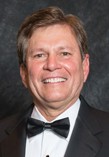Fluor Corp. has promoted long-time chief legal officer Carlos Hernandez to the position of interim chief executive officer.
Fluor announced Friday that Hernandez, who has been the company’s top lawyer since 2007, will temporarily replace David Seaton, who stepped down last week as chairman and CEO.

The Irving-based business has multiple leaders in its corporate legal department who served under Hernandez, including General Counsel Dawn Stout, who holds the title vice president for law and chief compliance officer. A 1997 graduate of the University of Texas School of Law, Stout practiced law at Weil Gotshal & Manges for nearly nine years before joining Fluor’s corporate legal department in 2006.
Kevin Hammonds, a lawyer with Fluor for about 23 years, also has the title general counsel.
Fluor has not announced who will replace Hernandez as chief legal officer.
Newly-appointed Fluor executive chairman Alan L. Boeckmann said the engineering and construction company has started a search for Seaton’s permanent replacement as CEO.
“The board has great confidence in Carlos,” Boeckmann said in a written statement. “We trust that he will provide the needed direction for the company and build upon Fluor’s leadership position in the marketplace.”
A civil engineer-turned-construction lawyer, Hernandez is widely recognized throughout the business and legal communities as a national leader in corporate compliance.
The Texas General Counsel Forum honored Hernandez, a zealous advocate of diversity in law firms, with its prestigious Robert H. Dedman Award for Ethics and Law in 2014. The GC Forum noted that Hernandez insists that the companies he’s worked for operate with strong moral conduct, even in times of severe crisis.

“Carlos is the epitome of ethics and professionalism,” Baker Botts partner Tim Durst told The Texas Lawbook in an interview in 2014. “His character has been repeatedly tested by fire throughout his life and career and yet he remains committed to doing what is right.”
Born in Cuba, Hernandez was merely four-years-old in 1958, but he told The Texas Lawbook that he remembers that Christmas Eve six decades ago vividly, as fighter planes firing bullets and missiles roared over his house.
“The family gathered in one spot in the house where we thought it would be safe for shelter,” he recalled in an interview in 2014. “It was very scary. Everyone was afraid.”
Years later, there was more fear and trepidation as Carlos and his parents fled Cuba for Miami in 1962, leaving behind all their belongings.
“We were political exiles,” he said. “We were in a new country, dealing with new people who spoke a different language. We had every intention of going back. We never thought Castro would survive.”
As a young boy new to the United States, Hernandez aspired to be a major league baseball player. His fellow high school seniors voted him “most likely to succeed,” according to his 1972 yearbook.
As he grew older, he developed a second passion: construction.
“I loved the idea of building bridges and highways and other structures,” he said.
Hernandez studied civil engineering at Purdue University in Indiana and then followed some friends to law school at the University of Miami.
“Studying law was not comfortable to me at all,” he said. “I loved the exactness of math and science.”
Because of his knowledge of engineering, Hernandez started his career as a litigator focusing on construction disputes.
Two years later, he took his first in-house corporate legal job. Hernandez spent 19 years in the corporate legal department at Armco Inc., an Ohio-based steel company. He was the general counsel in 2001 when the Enron scandal hit and Congress passed the Sarbanes-Oxley corporate compliance law.
“It changed everything for general counsel,” he said. “Corporate legal departments before Enron used to be run more like law firms responding to the legal needs of the companies. We now integrate the legal department with the business side and general counsel are more involved in nearly every aspect of a company’s operations.”
Hernandez said corporate in-house lawyers should be more business-minded, but they also need to have “a degree of separation and independence” from the business side.
“We need to be the legal and moral conscience of the company,” he said. “We obviously advocate for the company, but internally, if in-house lawyers find ourselves in conflict with our ethical duties, we should speak up.”
Part of doing the right thing, Hernandez said, is working diligently to improve diversity in the legal profession.
“I strongly encourage the law firms who work with us to be diverse – it is part of our standard engagement agreement,” he said. “It is highly disappointing that diversity continues to be a problem at so many law firms.”
Lawyers and business leaders say that Hernandez solidified his reputation as a strong ethical leader a decade ago when he handled the sudden and shocking 2003 demise of Fleming Companies, a $16 billion wholesale grocery distributor based in Lewisville.
When Hernandez took over as general counsel of Fleming, the business and its top executives faced multiple investigations by the U.S. Securities and Exchange Commission for securities fraud and overstating earnings. The company’s shareholders had filed multiple class action lawsuits alleging misconduct. The company’s largest client, Kmart, declared bankruptcy.
A year later, Fleming was gone, too.
“My experience at Fleming was tough and painful, but it was very instructive,” Hernandez said. “It was baptism under fire. It was a company with a lot of issues.”
Lawyers who worked on various aspects of the Fleming debacle say that Hernandez was the one stabilizing factor and that even the attorneys at the SEC and those suing the company realized that he could be trusted.
“Carlos was under great scrutiny from his own board of directors, the SEC and plaintiffs’ lawyers and he came through it because every action he took was ethical, thoughtful and professional,” Durst said.
Craig Birchette, an assistant general counsel over litigation and arbitration at Fluor, said Hernandez is an extraordinary lawyer and leader because he refuses to bend his ethics during tough times.
“Carlos put a previous job as general counsel on the line in situations where he had to tell senior executives that their conduct was improper and that the CEO had to leave,” Birchette, who worked for Hernandez at three separate companies, told The Texas Lawbook in 2014.
“I’ve seen Carlos facing situations where the conduct wasn’t specifically illegal but was in a gray area,” he said. “The easy thing for Carlos to have done was to simply tell the executives that the conduct was technically illegal. But that is not Carlos. He let them know that the conduct was improper and unethical.”
“He’s very level-headed during times of crisis and he instills calmness into every situation,” Birchette said. “When you describe most general counsel, ‘understated’ and ‘low-key’ are not words usually used to describe them.
“But Carlos is exactly that – he is so humble and gracious,” he said. “The people who work for him will take a bullet for him. He inspires loyalty.”
